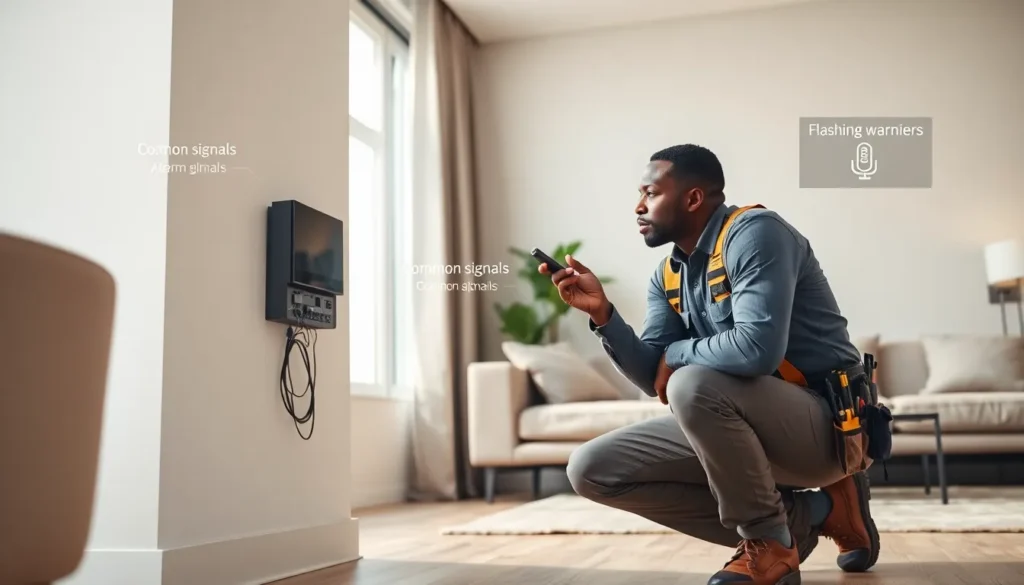Imagine this: it’s 2 AM, you hear a mysterious noise outside, and your heart races. You reach for your alarm system to call for help. But wait, the siren isn’t blaring, and the lights are flickering like an amateur disco. Panic sets in. Don’t let this happen to you. Home alarm systems, much like your favorite pair of socks, need occasional maintenance and sometimes, a bit of repair. In this guide, we’ll explore common alarm issues, handy DIY fixes, and when to call in the experts, all while keeping your home safe and sound. Buckle up, it’s time to get your security back on track.
Table of Contents
ToggleCommon Issues with Home Alarm Systems

Home alarm systems can be a bit finicky. Over time, several issues can plague even the most reliable systems. Understanding these problems is the first step in ensuring your home remains secure.
Identifying Alarm System Problems
Some common culprits include:
- Low Battery: Just like that one friend who can’t remember to charge their phone, alarm systems occasionally alert you to a dying battery. This usually results in annoying chirping sounds.
- Faulty Sensors: Sometimes, the sensors that detect movement can become overly sensitive or complacent, leading to false alarms or missed threats. Imagine your cat setting off the alarm every time it jumps on the sofa.
- Wiring Issues: If your system is older, wear and tear on the wiring can lead to intermittent failures, like a light switch that only works when it feels like it.
Signs Your Alarm Needs Repair
Watch for these red flags:
- Frequent False Alarms: If the alarm seems to have a mind of its own, it’s time for a checkup.
- No Response to Trigger Events: If the alarm doesn’t sound when it should, it’s like having a lifeguard that never gets into the water, pointless.
- Display Issues: A malfunctioning display could mean your system is having an existential crisis. If the screen is glitchy or not lighting up, it may be time to look for solutions.
DIY Troubleshooting for Home Alarms
Before calling in the cavalry, it’s worth trying some basic troubleshooting steps yourself. It’s like checking the fuse before losing your cool.
Basic Troubleshooting Steps
Begin with the easy fixes:
- Check the Battery: Change it just like you would your smoke detectors. If it’s low, replace it, then test the system again.
- Inspect the Wiring: Look for any visible damage. If wires seem frayed or disconnected, that’s a big red flag.
- Reset the System: Sometimes a simple reset works wonders. Refer to the user’s manual on how to reset your specific model.
- Clean the Sensors: Dust can accumulate over time. A quick wipe with a microfiber cloth can help your sensors function better.
- Test Each Sensor: Walk near each sensor to ensure they react appropriately. If not, they might need realignment or replacement.
When to Call a Professional
Although DIY is fantastic, sometimes it’s best to call in a professional. They have the tools and expertise necessary for more complex issues.
Choosing the Right Repair Service
Do your assignments:
- Read Reviews: Check the reputation of a repair service. Look for ratings on platforms like Google or Yelp.
- Ask for Recommendations: Friends and family can often steer you toward reputable services in your area.
- Get Quotes: Contact a few services and get estimates. Compare not only pricing but also the services offered.
Questions to Ask Before Hiring an Expert
Before you hand over your keys, ask these questions to ensure you’re making the right choice:
- What’s Your Experience? Find out how long they’ve been in business and what kind of systems they specialize in.
- Are You Licensed and Insured? Ensure they have proper credentials to protect yourself in case of accidents.
- What Guarantees Do You Offer? A reliable service should offer some kind of warranty on their work.
Preventing Future Alarm Issues
Once your alarm system is back in working order, it’s time to think about preventing future issues. A little bit of proactive maintenance can go a long way.
Regular Maintenance Tips
To keep your system running at peak efficiency:
- Schedule Annual Check-Ups: Just like your annual physical, your alarm system deserves some TLC. Schedule routine professional check-ups.
- Change Batteries Regularly: Set a reminder every six months. Trust us, your ears will thank you.
- Test the System Monthly: A quick monthly test can help catch any issues before they turn into larger problems.
Upgrading Your Security System
Sometimes, it pays to upgrade. If your system is old, investing in modern technology could save you time and headaches. Factors to consider:
- Smart Home Integration: Consider systems that integrate with smart home technology. This allows remote monitoring and control, ensuring your home is safe from anywhere.
- Latest Features: Look for advancements such as smartphone alerts, video monitoring, and enhanced motion detectors. These can provide a more comprehensive layer of security than basic systems.


